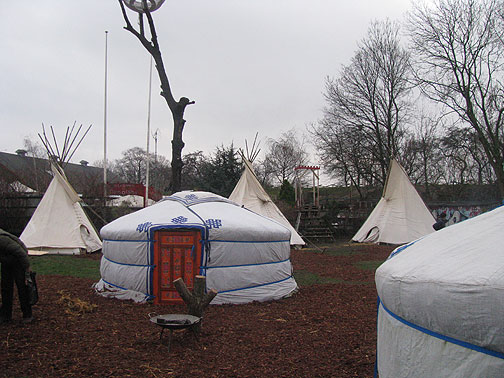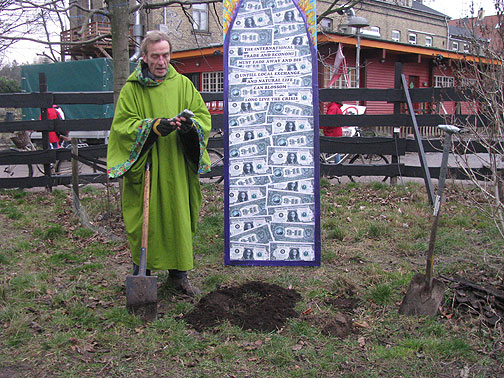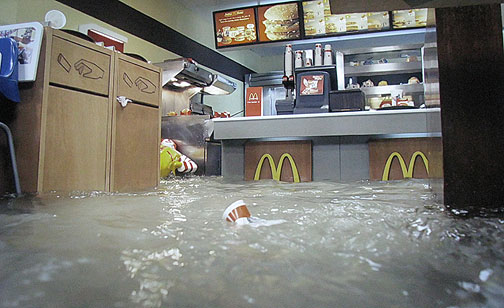Writing from the Climate Change Summit in Copenhagen, it has to be said at the outset that it is impossible to describe in depth everything going on here.
There are at least three separate conferences going on, and countless dozens of informal gatherings, secret cabals, backroom deals, and hidden plots. Some of these subrosa intrigues are among the major corporate and government players who also dominate the official proceedings at the Bella Center, where COP15 is underway. (COP refers to Conference of Parties, basically UN-ese for this 15th gathering of international delegations that started in Rio de Janeiro in 1992, ostensibly to come to grips with the environment. Now it is fully focused on trying to reach a global agreement to address the effects of climate change.)
Just yesterday, only two days into the nearly two-week conference, the UK Guardian published leaked memos indicating back-channel negotiations between the UK, the US, Denmark, and some other countries to sidetrack the UN-sponsored process in favor of one controlled by the richest countries, wherein the wealth transfer everyone agrees is necessary to help developing countries avoid becoming major fossil fuel burners would be managed by the World Bank or other institutions dominated by the US and EU.
This year, we’ve seen Mutual Aid in Motion.
From scaling sharing hubs to Mutual Aid 101 trainings, we’re helping communities build the tools they need.
Every dollar fuels lasting resilience – proving that when we move together, we all move forward.

Many organizations at the counter-summit hold that the wealth transfer should be seen as reasonable payments for "ecological debt," for over a century of emissions by industrialized countries that have wrecked the global environment for everyone, especially those who haven't benefitted.
Meanwhile, police staged a raid at 2:30 a.m. Thursday morning on the building the city has made available as a free place to stay to the large influx of protestors arriving from around Europe and the world. They didn't arrest anyone but did seize piles of wire cutters, paint bombs, and a dozen or so ladder contraptions made of plastic milk cartons suitable for getting over perimeter fences, amongst other things.
Local TV news reported with some concern that the demonstrators were planning civil disobedience and vandalism, and that they presented a real challenge to local police. Posters around Scandinavia in the past two weeks have shown black-clad protesters in pitched street battles with police under the slogan, "Capitalism is Stumbling. Let's make sure it falls!"
Black bloc anarchists and "autonomen" who have been a part of every major summit and protest since Seattle ten years ago are expected to appear here too, though their propensity for masked street battles with police might be pre-empted by local laws that prohibit wearing masks at or near a demonstration. We'll see what happens in the next few days but you can be sure that there are plenty of private plans being hatched.

At the decades-old squatted miltary base in old Copenhagen called Christiania, a "Windows of Hope" conference is being held in the Meadow of Peace among a cluster of yurts and teepees. It's quick name is "Climate Bottom"–and as that name indicates, it conceives of itself as the conference from below, from the grassroots.
 They have a full program of workshops and discussions all day every day, including a variety of performances and rituals. Every day at 14:00 (2 pm) there is the Funeral of the Day.
They have a full program of workshops and discussions all day every day, including a variety of performances and rituals. Every day at 14:00 (2 pm) there is the Funeral of the Day.
Yesterday we stopped by to watch the burial of "economic growth," a ceremony performed in Danish without translation in front of about two dozen folks under the perpetually gray skies here. Clad in a green wizard's outfit, Thor Finnstein (above) intoned the reasons why economic growth had to be buried–and then took one of the ubiquituos 9-1-1 bills that we know all too well in the Bay Area and ceremoniously laid it to rest.
We entered the main yurt for a presentation on ecovillages by a Scotsman from the famous old intentional community Findhorn. When he started to explain about social entrepreneurship, finding ways to do meaningful work while building lasting communities, I quietly exited. Not because I reject his ideas, but because I couldn't help but feel I was back in Northern California, where politics is routinely reduced to career choices and good ("correct") shopping. There is a certain stuckness about the idea that the best we can do is to withdraw into alternative communities and hope that by demonstrating healthy living the rest of the world will somehow begin to change.
Looking over the afternoon's options we decided to head over to the other alternative conference, Klima 09, where a wide range of academics, leftists, urban planners, geographers, artists, youth, indigenous, feminists, transit activists, and others are engaged in another full program of workshops, panel discussions, plenary sessions, and speeches.
Here there is a more serious attempt to address governments and politicians from the outside, as though the speakers and attendees feel they SHOULD have been invited to participate in the official UN conference, or at least that they are speaking to the agenda that SHOULD be under discussion inside the COP15.
Again, there are so many panels and workshops that unless you want to be a full-time attendee it would be impossible to describe the full range of information and ideas being presented. We glanced through the program and chose a workshop called Democracy and Climate Change which seemed to be about how the forms of democracy were insufficient to handle a problem like global climate change. How might democracy be changed or improved to adjust to the new paradigm of political decision-making we humans face?
But that is not what we found at that workshop. Instead, it was led by two very earnest young Danes, and the audience consisted of about 25 people, nearly all under 30 with just a few exceptions. Going around the room for suggestions, the organizers were intent on "actions," things we were going to do when we left the room that was going to "change democracy."
A rather odd framework to my way of thinking! How can deep, structured, centuries-old institutions be meaningfully altered by some quick "action" that a small group or an individual might take in a short time and space?
It seemed terribly flawed and frankly naive to expect such a thing from the discussion, but people piped up with their ideas. It captured something of conflicting levels of abstraction:
- The first guy was an elderly man from India and he spent five minutes doing math out loud about how much carbon emissions are in the world, are planned, vis-a-vis populations in various countries and their know carbon output, concluding that everything about the past, present and predicted future is so out of kilter that the solution was reparations and debt cancellation.
- Then a British woman got up to say that the media was so corrupted that she couldn't imagine any actions to take, but wondered how we might get the media to present "real news, real debates, real discussion."
- A Danish teenager suggested a massive screen in a public place that had a continuous readout of how many parts per million of CO2 there are in the atmosphere.
- A U.S. guy, probably about 25, said he wanted to start a cooking show that would demonstrate to young people how they can get food from local farmers and cook healthy delicious meals.
- A middle-aged woman from the U.S. midwest hoped that some rich person would buy advertising time on the Super Bowl and give information about how many millions of climate refugees there are already, as well as predictions for how many more there will be in years ahead.
And on it went. A weird combination of narrow, local ideas, and sweeping statements of problems that didn't lend themselves to "action." Many of the ideas suggested, from the local food security one, to a bike demonstration to a big free swap a la the "really, really free market," were altogether familiar, things we know people are doing around the world.
But the bigger problem that the workshop was supposed to address, the problematic relationship between existing democratic forms and the global crisis of the climate, went unaddressed. So after listening for a while we left.
Taking a break from workshops, we went to the Louisiana modern art museum about a half hour north on the Danish coast, where an art exhibit (there are dozens of shows around Copenhagen right now, all ostensibly addressing Climate Change in one way or another) called "This is Your World" offered two dozen artists' takes on this moment in time.

We especially loved "Superflex," a film about a McDonalds getting flooded. The camera starts panning an empty McDonalds, the quintessential global "space." After a few minutes of the familiar formica and plastic shapes, the machines and waiting burgers and fries, the Ronald McDonald statue in the corner, etc., water mysteriously begins to pour under the door from the bathroom.
The waters steadily rise as the film progresses, slowly engulfing everything in the place. By the end a murky water fills the place from top to bottom, with the sickening refuse of McDonalds trash, fries, etc. floating randomly around in it… quite the commentary on oceans rising and globalization.
Another short film presented a demonstration held in Tirana, Albania that made no demands, the marchers bearing only flexible mirrors… again a curious commentary on the emptiness and common narcissism of political demonstrations these days… as if the point of demonstrating was to feel better about oneself than to actually effect any change.
 We returned in the afternoon to the Klima 09 Conference to see a panel on Degrowth–or decroissance, as the French put it much more elegantly. Tim Jackson is the author of Prosperity Without Growth, and he was joined by a Mexican Miguel Valencia, and Sophy Banks of Transition Towns Totnes in England.
We returned in the afternoon to the Klima 09 Conference to see a panel on Degrowth–or decroissance, as the French put it much more elegantly. Tim Jackson is the author of Prosperity Without Growth, and he was joined by a Mexican Miguel Valencia, and Sophy Banks of Transition Towns Totnes in England.
Jackson's presentation was quite sharp, laying out the problems of pursuing the growth paradigm onwards, but also looking frankly at the destabilizing problems that accompany a process of "degrowth." He ran through a lot of the arguments and then paused to say that he wished, like many people (especially eco-activists in my home base in Northern California!) to find a bit of land above the rising waters where he could get off the grid, have a couple of goats and some chickens, and grow his own vegetables and fruit.
But he quickly dismissed this escapist fantasy to argue in favor of engagement, but to engage he admitted we had to overcome our sense of the intractability of the impossibilities we can easily identify. He argued for an "Economics for a Finite Planet," which involved ecological investment in poverty alleviation, low carbon transition, adn eco-system maintenance.
His program is centered on "ecological enterprise" that "treads lightly, supports and embeds itself in communities, and provides good livelihoods," since he does not shy away from the problem of work and self-sustainability that we currently look to wage-labor and the Economy to provide. Ultimately he seeks to redefine prosperity as our ability to flourish as humans within the ecological limits of a finite planet.
But his ringing endorsement of public goods and public spaces is most important, from a Shareable.net point of view. If people are to participate meaningfully in redirecting our lives, it depends on a sense of belonging, which in turn depends largely on the availability of public space and public goods.
I'll come back to this in the next post, because Denmark, Sweden, and Norway present the famous Scandinavian social democratic model, a version of capitalism that is far less harsh than what we take for granted in the U.S.

Interestingly, the major difference is the presence of a very large public sector, one that maintains and often expands public spaces, public services, and public well-being, helping to knit the societies together in a common project.
It's still capitalism, and the corporations that hail from Scandinavia don't behave radically differently outside of the borders of these countries. But as I'll show next time, the day-to-day lives lived here are far richer, more secure, more convivial, and more ecological, than what we accept in the U.S.
Until then!

